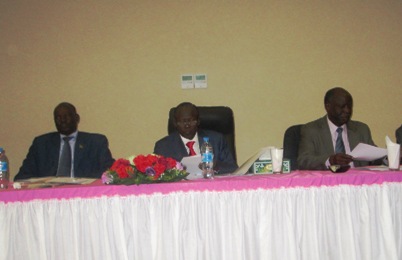S. Sudan sets no preconditions for talks with armed opposition
February 5, 2014 (JUBA) – South Sudan’s government has no preconditions ahead of the second round of peace talks with armed anti-government forces, Vice President James Wani Igga said on Wednesday.

“They will tell us what they want”, said Igga, referring to the SPLM/A in Opposition who are led by former vice president Riek Machar who assumed control of a series of defections caused by fighting with the army in Juba in mid-December.
“They are the aggrieved party and we shall first listen from them and we shall respond,” he added.
Riek Machar, who is accused by the government of president Salva Kiir of staging a failed coup in December, demands his former boss’s resignation as a condition for ending six weeks of armed confrontations with forces loyal to the government.
Igga, who replaced Machar as Vice President in August last year after Machar and the rest of the cabinet was sacked in July, said that any change of the leadership of world’s youngest nation must come through elections due in 2015.
The SPLM overwhelmingly won election in 2010, which occurred as part of the peace deal that ended decades of civil war and led to South Sudan’s independence in 2011. However, many analysts believe that elections served to solidify the SPLM’s position ahead of the upcoming independence referendum rather than help democratise either the former rebel movement-turned-ruling-party or the nation’s institutions.
In a show of solidarity with ruling SPLM, members of opposition parties agreed on December 21 to work with the government to find an amicable settlement to the current political turmoil that spilled over into the armed forces on December 15.
The leader of the SPLM-DC, South Sudan’s largest opposition party, by representation in parliament, Lam Akol, says that the current situation had produced a rare show of unity between the country’s political parties.
“The South Sudanese people with their resilience, with their determination, with their unity, with their clear vision, they stood together. And I think this is a very important achievement for us,” said Lam Akol in reference to alliance opposition political parties have shown with the SPLM since December.
Akol who had been in exile for most of South Sudan’s independence returned to Juba just weeks before the current conflict started.
Over one million people have been displaced by the fighting according the United Nations. The number of dead is unknown but International Crisis Group has estimated that some 10,000 people have died.
“Although the whole trouble started in the house of SPLM, but at the end it engulfed the whole country. Anything affecting the entire country is not more the affair of SPLM,” said James Wani Igga.
Machar and other internal opponents of President Kiir’s leadership had become increasingly vocal in their criticism of his leadership, describing his “dictatorial tendencies” in a press conference in early December.
A planned rally was postponed after Kiir called meeting of senior SPLM officials in Juba but after three days of debates over leadership issues and the passing of the parties internal documents, which ended when fighting began on December 15.
The political issues at the route of the conflict are expected to discussed when talks resume this week, following a shaky ceasefire deal signed on January 23 which both sides appear to have violated.
(ST)
